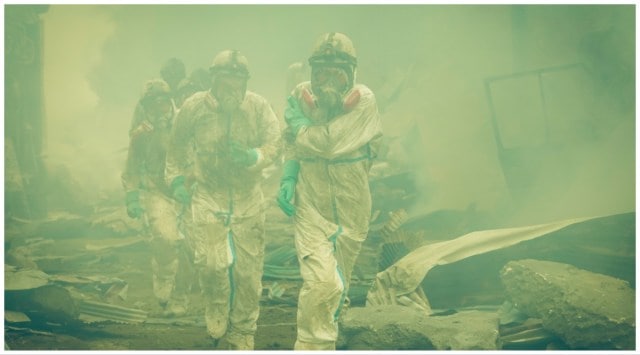The Days review: Netflix’s Fukushima mini-series lacks the artistry of Chernobyl
The Days review: Like the hulking symbol of arrogance at its centre, Netflix's mini-series about the Fukushima nuclear disaster also collapses under its own weight.
Written by Rohan Naahar
New Delhi | June 8, 2023

X
A still from the new mini-series The Days, based on the Fukushima nuclear disaster. (Photo: Netflix)
Detailed to the point of drudgery, Netflix’s The Days is a Very Serious Show about the 2011 Fukushima Daiichi nuclear disaster that gets so disappointingly lost in the weeds that it loses all sense of drama. Ostensibly a Japanese version of HBO’s seminal mini-series about the Chernobyl disaster — Fukushima and Chernobyl are the only two nuclear accidents classified as level five on the International Nuclear Event Scale — The Days lacks much of that show’s subtle artistry and clever socio-political sentiment.
As the title suggests, the eight-part drama is set in the days leading up to, during, and immediately after the accident, which was caused by a record earthquake that shook the very foundations of the nuclear plant, and resulted in structural damage that would quickly have a cascading effect. Veteran actor Koji Yakusho (13 Assassins) plays the site manager Masao Yoshida — a middle-aged gent happy with a middle-management role that would’ve likely lasted him till retirement. He’s this show’s equivalent of Jared Harris’ Valery Legasov from Chernobyl (without any of the disillusionment and post-traumatic stress that perhaps led to Legasov taking his own life).
It’s difficult to tell the exact timeline of events if you watch the show in one go. Episode one is designed as a typical disaster story; it ends with the earthquake and subsequent tsunami that set everybody on high alert. The next few episodes are dedicated to meticulous examination of the damage, the careful observation of rising radiation levels, and concerned planning about how to handle a potential fallout. By the time the reactor actually explodes in episode six — this was the inciting incident in Chernobyl, by the way — you’re either going to be mostly confused by all the detail that the show has been insisting you pay attention to, or too tired to continue.
But this curious structural decision is a key to engaging with The Days on its own terms. Unlike Chernobyl, which was mainly concerned with the consequences of not only a nuclear disaster but governmental deceit, The Days unfolds like an homage to individual heroism. And so, much of its run time is devoted to recreating, in great detail, the small missions that the plant’s workers undertook to — sometimes literally — close the nozzle on the damage.
But here’s the problem. Chances are that you still remember when a bunch of naked men entered the blast radius in Chernobyl to carry out an all-important mission that they knew would likely kill them. You probably also remember that harrowing scene in which Barry Keoghan murdered animals in an effort to contain the spread. But The Days has so many sequences involving groups of hazmat-clad men trudging in the dark, looking intensely at metre readings, and screwing valves that after a point, they all begin to blend into one another. We get no sense of who these people are as individuals, or why they want to participate in these kamikaze missions, and the show isn’t concerned about that either. Nor is it tempted to step outside ground zero and reveal how nearby communities are reacting to the developments. Each of its eight episodes is mostly restricted to rooms, large and small, opulent and spare, cramped and capacious.
What stands out, however, is Yoshida’s quiet evolution from a mild-mannered paper-pusher into a true wartime general. His big moment comes when he ignores official orders to stop showering the destroyed reactor with seawater — a strategic move that averted a massive catastrophe. In one scene, Prime Minister (Fumiyo Kohinata) is gravely informed that if the fault-lines aren’t repaired, a third of Japan, including Tokyo, could be affected by radiation.
While Chernobyl was mostly disparaging towards all forms of authority — it was, after all, a show about bureaucracy — The Days doesn’t have any particularly strong statements to make about how the situation was handled. Even the regular press conferences through which officials communicated latest updates about the relief efforts reveal their confusion more than any sort of complacency or moral corruption. In Chernobyl, the corner-cutting mentality of government servants was baked into the plot. This, primarily, was the reason behind the disaster. But in The Days, the ‘villain’, at least in the early episodes, is nature itself.
Somewhat counterproductively, the show’s best sequence is its last. This is when it’s central theme is communicated via an effective montage charting Japan’s post-war economic growth. The show also manages to find time for some philosophical rumination about the hubris of man, and the all-consuming power of nature. In many ways, The Days could be a nice companion piece to another piece of Japanese pop-culture about the corrosive allure of greed and ambition: Godzilla.
00:15 / 00:30
Co-directed by Masaki Nishiura and the rather well-respected Hideo Nakata — he was one of the strongest voices of the J-horror movement that swept the world two decades ago — The Days has little authorship; it feels more inspired by older disaster stories than an individualistic piece of storytelling. But most unfortunately, like the hulking symbol of arrogance at its centre, it, too, collapses under its own weight.
The Days
Creator – Jun Masumoto
Cast – Koji Yakusho, Yutaka Takenouchi, Fumiyo Kohinata
Rating – 2.5/5
No comments:
Post a Comment